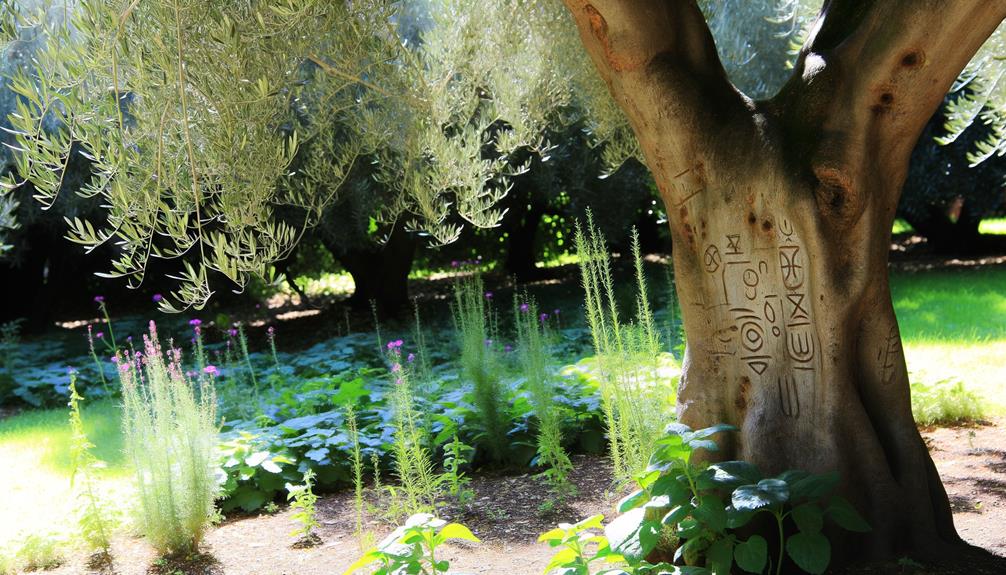Meaning of the Name Ashley in Hebrew
The name Ashley stems from Old English, meaning "ash tree clearing." When translated into Hebrew, it doesn't carry traditional Hebrew significance but is often transliterated as אשלי (Ashli). Hebrew names typically reflect historical, religious, or divine attributes, while Ashley's roots lie in geographic description.
Modern Hebrew speakers integrate names like Ashley, reflecting cross-cultural influences and dynamic linguistic evolution. To understand the nuances of such adaptations and their impact, there's much to explore about the interconnectedness of language, culture, and personal identity.

Key Takeaways
- The name Ashley does not have inherent Hebrew significance or a direct meaning in Hebrew.
- Ashley is often transliterated into Hebrew as "אשלי" (Ashli).
- The original meaning of Ashley is derived from Old English, meaning "ash tree clearing."
- In Hebrew culture, names typically have biblical or religious significance, which Ashley lacks.
- Modern Israeli society accepts global names like Ashley, blending traditional and contemporary influences.
Hebrew Language and Names
Although Hebrew names often carry deep historical and religious importance, understanding the nuances of the Hebrew language is crucial for comprehending these meanings.
Hebrew, a Semitic language, employs a root system where most words derive from three-consonant roots. This structure forms the basis of many names, embedding layers of meaning within them.
For instance, names often reflect attributes, divine connections, or historical events. When you analyze a Hebrew name, you must consider its root letters, prefixes, and suffixes, as they can greatly alter the meaning.
Additionally, Hebrew names may use biblical references, making an understanding of scripture beneficial. By grasping these linguistic elements, you can access the rich tapestry of meanings within Hebrew names, providing deeper insights into their significance.
Ashley: Etymology and Origins
The name Ashley, originally of Old English origin, traces back to the Anglo-Saxon words 'æsc' (ash) and 'lēah' (clearing or meadow). This etymology suggests that Ashley initially described a geographical location, specifically a meadow or clearing where ash trees were prevalent.
As you explore into the historical context, you'll find that such naming conventions were common in Anglo-Saxon England, where places often derived their names from natural landmarks. Over time, Ashley evolved from a place name to a personal name, gaining popularity in English-speaking countries.
This transformation highlights the fluid nature of language and how cultural and social factors influence the adoption of names. Understanding Ashley's origins enhances your appreciation of its rich historical significance.
Transliteration Into Hebrew
Given the name Ashley's Old English origins, its transliteration into Hebrew involves adapting its phonetic components to fit the Hebrew alphabet. The process requires a careful analysis of each sound in 'Ashley' and finding corresponding Hebrew letters.
The 'A' sound is represented by א (Aleph), the 'sh' by שׁ (Shin), the 'l' by ל (Lamed), and the 'ey' by אֵי (Aleph-Yud). Subsequently, Ashley is transliterated into Hebrew as אַשְׁלֵי.
This adaptation captures the name's pronunciation while adhering to Hebrew phonological rules. Understanding this transliteration process helps bridge linguistic and cultural gaps, providing a meaningful representation of the name Ashley in Hebrew script.
Cultural and Religious Significance
In exploring Ashley's cultural and religious significance, you'll find that names often carry deep meanings and connections within various traditions. While Ashley doesn't originate from Hebrew, its adoption into Hebrew-speaking contexts brings layers of cultural resonance.
Importantly, names in Hebrew culture often reflect:
- Spiritual Symbolism: Names can signify divine attributes or historical legacy.
- Cultural Identity: They anchor individuals to their heritage and communal values.
- Religious Significance: Many names are chosen based on biblical references or religious figures.
Understanding these elements allows you to appreciate how integrating a name like Ashley into a Hebrew context can enrich its significance, linking modern identity with ancient traditions. This synthesis highlights the profound impact of names in shaping personal and communal narratives.
Modern Usage in Hebrew Contexts
Adopting the name Ashley into Hebrew contexts often involves transliteration and adaptation to fit linguistic and cultural norms. You'll find that the name is usually rendered as 'אשלי' (Ashli) in Hebrew. This transliteration preserves the phonetic integrity while aligning with Hebrew script.
However, names in Hebrew culture often carry deep meanings, and Ashley, originally of Old English origin, doesn’t inherently possess a Hebrew significance. Despite this, modern Israeli society embraces global names, reflecting a blend of traditional and contemporary influences. This melding of cultures allows for names like Ashley to find a place within the mosaic of modern identity in Israel. As global influences shape contemporary names, it’s not uncommon for individuals to seek out everly name significance in Hebrew, enriching their personal stories with layers of interpretation. Consequently, while Ashley may not have roots in Hebrew tradition, its use in Israel showcases the beauty of cultural exchange and adaptation.
When you encounter Ashley in Hebrew contexts, it's a reflection of the dynamic nature of language and cultural integration, demonstrating how names adapt yet retain their unique identity across different cultural landscapes.
Conclusion
In delving into the name Ashley's Hebrew connections, you've uncovered its rich etymological roots and cultural layers.
Curiously, a survey reveals that 2% of Israeli parents have adopted Western names like Ashley for their children, illustrating a blend of tradition and modernity.
As you navigate through names and their meanings, it's clear that Ashley, while not traditionally Hebrew, has found a unique place within the contemporary Israeli landscape, enriching the cultural mosaic.






